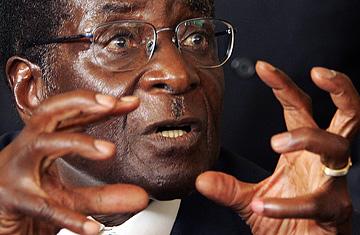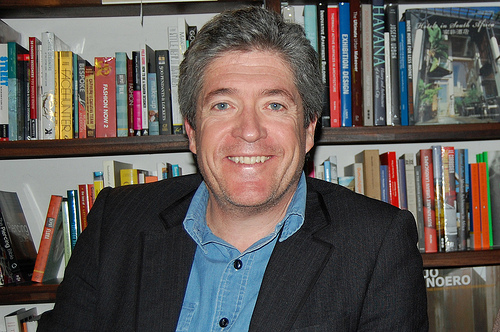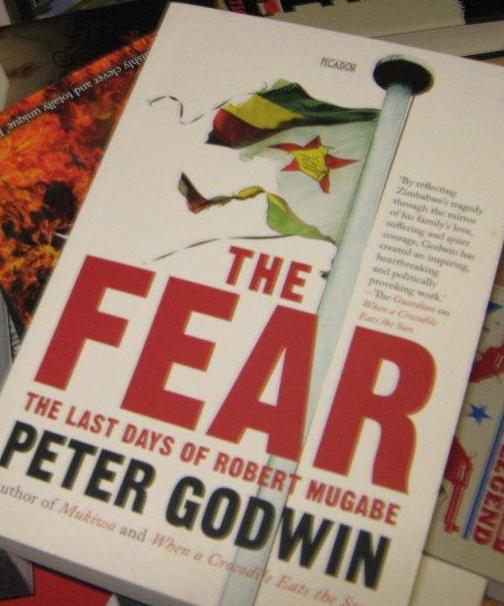The Last Days of Robert Mugabe

Peter Godwin talks about his latest book, The Fear: The Last Days of Robert Mugabe. Interview with John Paul O'Malley.
Peter Godwin is sitting in a busy café on Hampstead High Street in North London. Before this interview he had a meeting with a human rights lawyer. "We're trying to help out these people who use homeopathic medicine in Africa. It's part of their culture, and pharmaceutical companies are trying to rip them off. It's the equivalent of copyright, it's kind of tricky and to do with international law," he says, ordering a second latte.
Godwin (pictured below), was born in Southern Rhodesia (now Zimbabwe). Before he became a famous journalist, author, and documentary maker, he was a soldier, conscripted into the Rhodesian forces. Then he trained as a lawyer.
Some of the first clients he represented just so happened to be leaders in the guerrilla army: ZIPRA (Zimbabwe People's Revolutionary Army). It was here that Godwin got his first big scoop in journalism.

"I was working as a rookie reporter for the Sunday Times, and started to hear that bad stuff was going on in Matabeleland. I managed to sneak in with some African nuns. I went in pretending to be a priest going back to a mission station. It was absolutely appalling. They had lists of ZAPU party officials, and they were just picking these people up and taking them to this base, where they were torturing and killing people, and throwing bodies down mineshafts. It was a crime against humanity, they killed around 20,000 innocent civilians."
Since that first experience of genocide in the early 1980s, Godwin has reported from just about every major violent political conflict worldwide.
In 2008, when Robert Mugabe lost the election in Zimbabwe to Morgan Tsvangirai, the leader of the opposition party Movement for Democratic Change, Godwin travelled from New York back home to "dance on the grave of Mugabe".
However, in a country that has effectively been a one-party state since its foundation in 1980, Mugabe, it turned out, would not be leaving power any time soon.
The Fear: The Last Days of Robert Mugabe is a harrowing account of the wave of violence that Mugabe and his loyal ZANU-PF party unleashed on the people of Zimbabwe in the wake of the 2008 elections. It was a book Godwin thought he'd never have to write.
"When I went back in 2008, I thought that this was going to be the end of it all, Mugabe had lost the election, and he would now accept his loss and step down. Instead, he launched this appalling campaign of violence and torture on an industrial scale, and that's how the book came about. A lot of journalists were thrown out, opposition leaders had fled, the NGOs had been restricted in Harare, and in that vacuum, they started killing people. I thought going in on that visit that I would be celebrating Mugabe's demise and his exit from politics. Instead it turned into this nightmare."
The nightmare that Godwin refers to is written about in excruciatingly close detail in the book. He describes how the "breadbasket of Africa" rapidly turned into a place where gang rape, torture, starvation, interment and murder all became an everyday reality for its citizens.
So where exactly did it go wrong for Zimbabwe? When did Mugabe start to lose the plot?
Godwin believes that Mugabe has been a manipulative dictator from the very start of his tenure as President (in 1980 when Zimbabwe gained independence from Britain). It's not Mugabe who has changed, he says, but the world.
"The conventional wisdom on Mugabe, if you were to listen to the mainstream media, is that he comes in to power in 1980, and he's very reconciliatory. Zimbabwe becomes this rapid success story, environmentally, economically, educationally. It has the highest literacy rate in Africa. And then suddenly in 2000, Mugabe gets a sudden rush of blood of the head and turns into this villainous dictator that we all love to hate.
"My thesis would be that Mugabe behaves in a very consistent fashion whenever he faces political threat. So you go back to the guerrilla war itself, which is technically a response to white intransigence, morally defensible perhaps. But it's saying violence is the way we will sort this out, and it works.
"In 1980, in those first elections, Mugabe deliberately leaves a lot of those guerrillas out in the fields - who go around saying you vote for us or else - the irony of course is that he would have won that election anyway, but what it shows you is that Mugabe is more interested in power than in democracy. Democracy serves Mugabe's purposes as long as it delivers power to him. The minute it stops, you see that he's not actually a democrat.
"Then you have the Matabeleland massacre, and nobody really does anything about it, partially because we are in the Cold War then, and Africa is divided up into this proxy battlefield. Mugabe is seen as one of ours, he's not seen as pro-Moscow. In those days that was all the West cared about.
"The other thing is that we have apartheid going on and Mugabe is the chairman of the front line states, the West doesn't really want to undermine him particularly. In '85/86 he forces the ZAPU party into a government of national unity, who are never really heard of again, and from then on really for the next 15 years you have a one-party state. And you don't see Mugabe using violence, because he doesn't have to. But when an opposition remerges in 99/2000 he uses violence again. So he's been the same guy, it's just the world has changed, the Cold War has gone, apartheid has gone, he has fewer smoke screens to hide behind. One thing about Mugabe is that he's been pretty consistent."
When the Cold War ended, the West had no problem replacing the olive branch with a gun in many Middle Eastern states. So why does the West continue to ignore the catastrophe that is happening in Zimbabwe, and not intervene now?
"I'm frustrated that there hasn't been more western intervention in Zimbabwe, but I think it's unrealistic to expect military intervention, because Zimbabwe lacks the two exports that rationally trigger those interventions: oil and terrorism. There has been a rolling major humanitarian catastrophe in Zimbabwe where people have been dying through a toxic cocktail of HIV, starvation, malnutrition and economic collapse. Part of the problem is that the West has abrogated the Zimbabwe problem to South Africa, and South Africa hasn't done anything. It hasn't acted as the honest broker it was supposed to be."
In his book, Godwin describes the systematic murder of Mugabe's opponents as "smart genocide". He says there is no need to directly kill hundreds of thousands, if you can kill the right few thousand. Not genocide, Godwin says, but politicide – eliminating a political movement rather than an entire race of people. I ask Godwin if the semantics of words are meaningless when hundreds of thousands are still dying, albeit from other causes?
"Genocide is in the eye of the beholder to some extent. It sort of has two parts to the definition: one is quantity, the other is the choice of people - how indiscriminate is it? In Zimbabwe I use the term polticide. But that is a kind of genocide itself because you are killing a people; it's a whole class of people, whether by nationality, class or religion. I think people get very sensitive about the use of the word because it triggers certain obligations under international law for the UN to do something about the conflict. There are many other ways to commit genocide other than down the barrel of a gun. You can take people's livelihoods away and essentially starve them. You can also go back demographically and correlate how many people have died from HIV unnecessarily because of poor health care and lack of medicine, and my belief is that it would be more than a million people."
As Mugabe moves on to the ninth decade of his life, a change seems inevitable for Zimbabwe, which has had a dictator for over three decades. Godwin says it is hard to predict what will happen next however.
"At the moment Zanu-PF is having terrible trouble handling transition. Mugabe is 87, he's not going to last forever, and even if he doesn't die, he's already starting to lose capacity for leadership. Zanu-PF faces a very dangerous time - if Mugabe dies in office they could potentially face a conflict. Nobody really knows because - here is one man who has completely dominated the political landscape since the country was born in 1980. It's incredibly difficult to speculate what is going to happen because we've never had this situation."
Despite the racial tensions in Zimbabwe between whites and blacks, Godwin maintains that the country can still become great again, one where blacks and whites could work and live side by side.
"In a weird way what Mugabe has managed to achieve, is lessening general racial tensions, in so far as the opposition is multi racial, and we've all been in the trenches together - the people who have been opposing the dictatorship for ten years now - so I think if democracy is restored to Zimbabwe, it has a real shot of becoming a post racial country."
- The Fear: The Last Days of Robert Mugabe.
- Release date: October 2010
- First published: October 2010
- Publisher: Macmillan
- Authors: Peter Godwin
- Dimensions: 233 x 153 x 27mm (L x W x H)
- Format: Paperback
- Pages: 353

